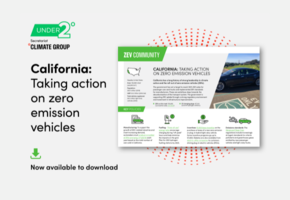Through the ZEV Community’s ‘Taking action on zero emission vehicles’ series, we’ve shone a spotlight on the Netherlands’ leading commitments and ambition on ZEVs.
The series aims to profile the ZEV policies, targets and achievements of governments from around the world.
.png?itok=mFAHWtFi)
Click to download the Netherlands’ profile.
The Netherlands is a leader in both the European and global electric vehicle markets and is committed to delivering supportive policies, strategically rolling out charging infrastructure and cooperating with cities, industry and other stakeholders.
With ambitious targets to achieve a 49% reduction in emissions (below 1990 levels) by 2030, and net zero emissions by 2050, the Netherlands must implement and deliver on bold climate policies, including across the transport sector. Its 2019 National Climate Agreement sets out key actions on sustainable mobility and logistics, with a vision for zero emission, carefree and accessible mobility for everything and everyone.
- 100% of all new passenger cars sold will be zero emission by 2030
- 100% of buses in operation will be zero emission by 2030
- 100% of all vehicles on the road will be zero emission by 2050
Over the past few months, key developments have been made towards the government’s ambition to have zero emission zones for all logistical vehicles in 30-40 large cities from 2025. Nineteen cities have now agreed to the approach and have announced the boundaries of their zones for freight vehicles. By implementing zero emission zones, cities will have lower greenhouse gas emissions, cleaner air, and become less congested.
The Netherlands also boasts one of the densest EV charging networks in the world. The increasing adoption of electric vehicles has tripled the need for charge points by 2025 and eight-folded it for 2030. To meet these demands, the government is collaborating with regional, city and local governments, as well as private sector stakeholders, to ensure a safe and sufficient roll-out of charging infrastructure.
Through its participation in ZEV Community, the Netherlands has joined state, regional, city and national governments from around the world in exchanging best practice and experiences of accelerating the transition to clean transport.



